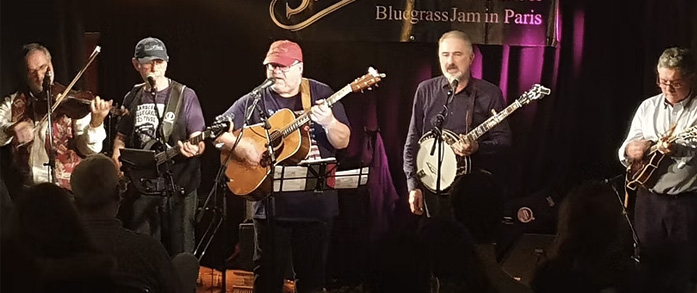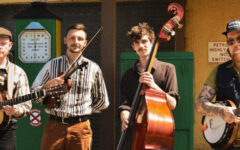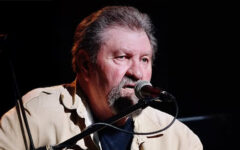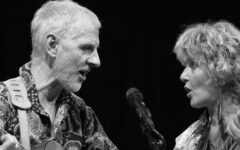
Making their home in the idyllic environs of Paris, The String Fellows epitomize what it means to cross cultural boundaries. The group — which consists of Christian Poidevin (bass, harmonica, lead and harmony vocals), Hervé Nicolle (guitar, lead and harmony vocals), Jean-Marie Daviaud (mandolin and harmony vocals), Jean Darbois (fiddle, nyckelharpa, and open-back clawhammer banjo), and Bertrand Coqueugniot (banjo and harmony vocals) — prides itself on having two lead Vocalists
“It opens the possibilities in the choice of songs,” Coqueugniot explains. “I join on harmony vocals to complete the trio.”
So too, the fact that they incorporate the nyckelharpa also singles them out for distinction. “It’s a Swedish instrument which sounds a little like an alto violin,” Coqueugniot adds. “It’s a very amazing, and kind of strange, instrument, and Jean Darbois uses it on a couple of tunes.”
That said, the band’s bluegrass roots go back several decades. “All the members of the band started playing bluegrass in the mid-seventies,” Coqueugniot added. “Because France is a small country, we all crossed our paths in concerts or festivals, and over the years we became friends. We were members of different bands, but we often spent time jamming together in any occasions. There was a major bluegrass festival in Toulouse, France in 1983, ’84 and ’85 that featured acts like Seldom Scene, New Grass Revival, and Hot Rize, to name a few, and the funny point is, all members ofTthe Strings Fellows played in Toulouse in 1984, each being in a different band.”
Nevertheless, the connection was cemented as time went on. “Some years later, some of us played together, such as the fiddle player, Jean Darbois, and me in a band called Sarah Band, whose particularity was to sing mostly in French,” Coqueugniot continued. “But being non-professionals we all had day jobs, leaving less time for playing music. However, in 2015, we reunited to form The Strings Fellows, with the actual line-up being completed in 2017. We like to play together, as well as simply spend time together, including every New Year’s Eve. That’s been a tradition for years. Friendship is the cement of our band.”
That said, the players also share some musical bonds in common. “We are all inspired by the different trends in bluegrass,” Coqueugniot explains. “And of course, the music of Bill Monroe, Flatt & Scruggs, and other pioneers was among our influences. Our tastes also include Country Gazette, Seldom Scene, Country Gentlemen, Hot Rize, JD Crowe & The New South, Bluegrass Album Band, Tony Rice, New Grass Revival, Tony Trischka & Skyline, Old & In The Way, David Grisman and Peter Rowan, among others. I would say our sound is classic and contemporary bluegrass, focusing on vocals and integrating some other influences such as Irish-oriented fiddle tunes as well as some acoustic country and pop. We are not necessarily a pure traditional bluegrass band as we like to offer a wide variety of sounds.”
Given the fact that the band members all have day jobs, The String Fellows don’t undertake extensive tours, preferring instead to focus on local venues, clubs, and festivals as their individual schedules allow. “In the ’80s there were some important festivals in our country, such as Toulouse Bluegrass Festival and Angers Bluegrass Festival,” Coqueugniot notes. “They featured acts like those I mentioned before, as well as the Tony Rice Unit, Eddie Adcock & Talk Of The Town, Bluegrass Cardinals, Peter Rowan, Darol Anger and Mike Marshall, Marty Cutler, and Chris Hillman. This offered a wide range of bluegrass music to the French audiences and it was very influential for local musicians.”
As a band, The String Fellows have only had the opportunity to perform at the La Roche Bluegrass Festival in 2022 where they performed with Roger Mason, an American artist who has lived in France Roger for 32 years. They’ve continued to appear with him frequently over the past three years.
Aside from their combined efforts as a band, each of the players have had solo success as well. Darbois takes part in the group known as Transatlantic, has backed Peter Rowan, and was once a member of Tony Trischka’s band when Trischka toured France at the end of the ’70’s. As a harmonica player, Christian Poidevin had the opportunity to perform and record with several American artists, including Barry “The Fish” Melton from Country Joe and The Fish. He also was singer and harmonica player in the French country band, Open Road, recipients of three awards for “Best French Country band.”
Coqueugniot himself released a solo album called Banjo Rendezvous in 1987 that featured Peter Rowan, Vassar Clements, Mark Hembree, and fiddle player Susi Gott and various French musicians. It received rave reviews. “The amazing thing is that three of the future Strings Fellows were playing on this record — Jean Darbois, Jean-Marie Daviaud, and Christian Poidevin,” he points out. “There was another American musician on it too — mandolin player Rob Griffin. Rob used to be part of Mark O’Connor’s touring band and he played and recorded with Garland Shuping. We met at the Toulouse Bluegrass Festival when he played with Marty Cutler.”
Aside from a project planned for 2025, The String Fellows released a mini album called Cajungrass under the name Roger Mason & The Strings Fellows. Coqueugniot describes the music as a mix of cajun and bluegrass, with tracks like Jambalaya, City of New Orleans, and Laisser Les Bons Temps Rouler, shared and sung in French.
In addition, various members of the group have participated in different projects. Poidevin played on the Banjo Paris Sessions album along with Bill Keith and Jim Rooney, as well as with the band Wells Fargo for an album that sold very well in Europe. Daviaud recorded with Jean-Marie Redon’s band Stylix, and on an album by the French band, Crazy Duck. Daviaud played on a recording by the noted French flatpick guitarist, Thierry Massoubre, called Behind The Strings.
In addition to his solo outing, Coqueugniot guested on an album by a band called Bluegrass Matinée released in 1983.
Taken in tandem, their efforts have resulted in a collective effort that’s both varied and versatile.
“Our choices regarding instrumentals bring the shows some punctuation between songs,” Coqueugniot insists. “It could be fiddle tunes such as Temperance Reel, breakdowns like Stoney Creek, or classics such as Nine Pound Hammer. We do a kind of pause between our bluegrass sets, taking a moment when one or two of us do tunes or songs that are mostly non-bluegrass. Christian could sing a song with just harmonica and vocal. Jean, the fiddle player, could play his fascinating instrument, the nyckelharpa, covering some Bach or Irish music before moving to Lonesome Fiddle Blues with the whole band joining him. Hervé and Jean-Marie could do some old traditional songs such as The Weeping Willow Tree, a la Rice & Skaggs, or Jean and I might do some banjos duets or some clawhammer and finger picking together. Hervé, Christian and I like to do a cappella songs such as Talk About Suffering Here Below or My Little Georgia Rose.
He adds that audiences really seem to enjoy those particular moments. “We love entertaining people,” he says. “Being close friends for years helps add to the fun, and our complicity on stage is also enjoyed. I would say that even if bluegrass audiences are not prevalent in France, there are people who appreciate this style, and our music is well received. Being among the pioneers in bluegrass, we have some experience when it comes to working hard on our tight renditions. Because French people don’t have a specific background in bluegrass, hard-driving instrumentals are not what appeal the most to them, even if they are impressed by the versatility. Therefore, our repertoire is mainly oriented towards vocals. Audiences love nice songs and nice vocals and they always give us a warm welcome.”
In that regard, Coqueugniot sums things up succinctly.
“I think that in a band, the most important thing is not necessarily the talent of each individual member, but rather the sum of all these talents combined.”







